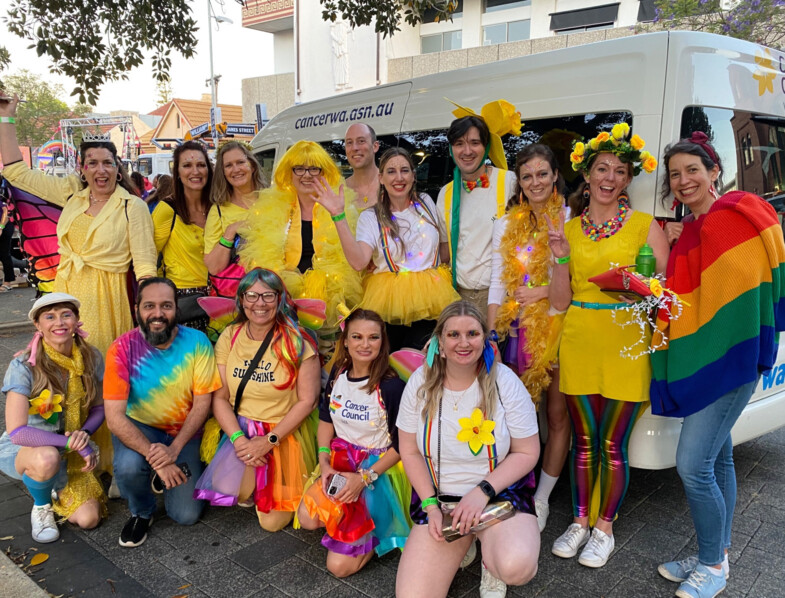Since 2018 Cancer Council WA staff, family, friends and volunteers have walked in the PrideFEST WA Parade to show support for our LGBTIQ+ community. On 25 November we’re hoping to be bigger, better, brighter and sparklier than ever!
LGBTIQ+ people and cancer
This year’s PrideFEST theme is “Be Brave, Be Strong, Be You”, with a focus on celebrating the bravery and resilience of the LGBTIQ+ community. This is particularly relevant for LGBTIQ+ people who may be impacted by cancer.
Research shows that LGBTIQ+ people experience unique and additional challenges around cancer prevention, screening, diagnosis, and treatment. LGBTIQ+ people are also at a higher risk of certain cancers, including breast, ovarian, and anal cancers.
Some factors that contribute to this include:
- Higher rates of smoking. Smoking causes 16 different types of cancer and smoking rates in the LGBTIQ+ community are about double the rate of the general population.
- Higher risk of Kaposi’s sarcoma, Non-Hodgkin lymphoma and cervical cancer.
- Lesbian and bisexual women are less likely to benefit from the protective impacts of parity1, breastfeeding or taking contraceptive pills. This puts them at higher risk of certain cancers, such as ovarian cancer.
- LGBTQI+ people are less likely to access cancer screening. Reasons can include:
- Misconceptions and underestimation of risk, for example, lesbian women believing they are at a lower risk of cervical cancer because they do not engage in heterosexual sex
- Discomfort in screening process
- Barriers accessing support due to fear of discrimination by health professionals or peers, for example, fear of not being accepted (or a partner not being accepted) in a support group setting.
- Less support from parents and families when dealing with a cancer diagnosis and treatment.
- Lower satisfaction with cancer treatment, support and care.
- Feelings of anxiety, invisibility, isolation, and frustration throughout the cancer care experience and worse outcomes following a diagnosis of cancer.
LGBTIQ+ Australians are often neglected in Australian research and monitoring mechanisms. This contributes to knowledge deficits and some of the above issues including assumed heterosexuality, heterocentric care and lack of relevant support groups.
Why we are walking in PrideFEST
Cancer Council WA is the state’s leading cancer charity, which means every day we’re working to support families, to prevent cancer, and save lives.
Here are a few of the reasons why we are walking in this year’s PrideFEST:
- We believe everyone affected by cancer has the right to access practical and emotional support services and information throughout their cancer journey.
- We understand that LGBTIQ+ people diagnosed with cancer have unique issues and concerns, and our support services are committed to meeting these needs in a sensitive way.
- We understand lesbian, gay, bisexual, transgender, queer or questioning, and other diverse sexualities and genders, as well as people with intersex variations can have an increased risk of developing cancer too.
- Our programs and services take an inclusive approach.
We want everyone, no matter how they identify, to feel safe, heard and supported before anything else.
You first, then cancer.
For more information
- Read our LGBTQI+ People and Cancer brochure.
- Call 13 11 20 for cancer information and support.
- Read the Australian Cancer Plan for information about the current and future state of cancer care for LGBTIQ+ people in Australia.
1Parity is defined as the number of times that she has given birth to a foetus with a gestational age of 24 weeks or more, regardless of whether the child was born alive or was stillborn.
